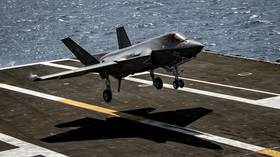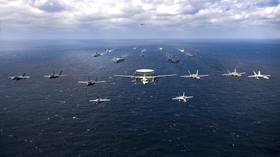Sailors injured after US fighter jet botches landing near China

Seven US Navy personnel were injured after a pilot suffered a “landing mishap” on a US supercarrier and was forced to eject from the aircraft while performing operations in the South China Sea.
The US Navy announced on Monday that one of its F-35C Lightning II stealth planes had a “landing mishap on deck while USS Carl Vinson (CVN 70) was conducting routine flight operations in the South China Sea.”
The pilot ejected from the aircraft and was rescued by a military helicopter. However, a total of seven sailors were injured during the incident, with three requiring a medical evacuation to the Philippines. The three sailors are reportedly in stable condition.
The other four injured sailors were treated aboard the ship and three have since been released.
Exactly what went wrong is currently being investigated by the US Navy authorities.
Navy supercarriers USS Carl Vinson and USS Abraham Lincoln were performing a drill in the South China Sea at the time of the accident as tensions between the US and China continue.
Rear Admiral Dan Martin, the commander of Carrier Strike Group 1, boasted this week that the drill “highlights the U.S. Navy’s ability to deliver overwhelming maritime force, when called upon, to support a free and open Indo-Pacific region.”
“We are committed to ensuring the lawful use of the sea and free flow of commerce while deterring those who challenge the shared vision of a free and open Indo-Pacific now and into the long-term future,” he continued.
Beijing has territorial claims to almost all of the South China Sea, and routinely denounces Washington’s operations in the area as a violation of its sovereignty. Several other nations, including Vietnam, Malaysia, Brunei, and the Philippines, also claim various islands in the disputed waterway.













